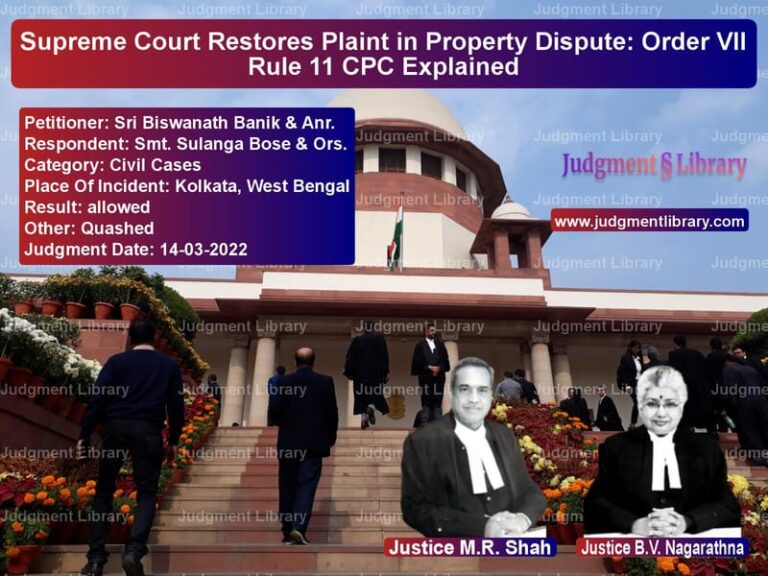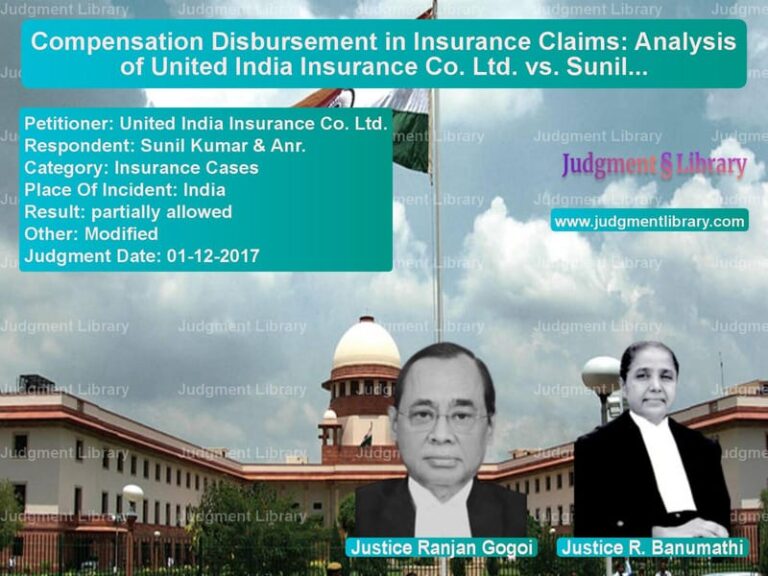Bank Locker Responsibility: Supreme Court Holds Banks Accountable for Negligence
The Supreme Court of India recently delivered a landmark judgment in the case of Amitabha Dasgupta vs. United Bank of India & Ors., addressing the responsibilities of banks in handling customer lockers. This case arose after a customer’s bank locker was broken open due to alleged non-payment of rent, and valuable jewelry stored inside was reported missing. The judgment sets significant precedents regarding the liability of banks in such situations and lays down new guidelines for locker management.
The case was filed after the appellant, Amitabha Dasgupta, found that his locker at the United Bank of India’s Deshapriya Park Branch in Kolkata had been illegally broken open, and most of its contents were missing. Despite the bank admitting its mistake, the compensation awarded by consumer courts was contested, leading to the Supreme Court’s final ruling.
Background of the Case
Facts Leading to the Dispute
The locker in question, bearing number A-222, was rented by the appellant’s mother in the 1950s. In 1970, Amitabha Dasgupta was included as a joint holder. However, on 27.05.1995, when he visited the bank to operate the locker and pay the rent, he was informed that his locker had been broken open on 22.09.1994 due to alleged non-payment of rent. The locker had also been reallocated to another customer.
The appellant produced receipts showing that rent had already been paid on 30.07.1994, proving that the locker was broken open unlawfully. The bank admitted its error in a letter but denied responsibility for missing valuables, claiming that only two gold ornaments were found when the locker was opened.
Legal Proceedings
- The appellant filed a complaint before the District Consumer Forum, demanding the return of missing jewelry or compensation of Rs. 3,00,000 along with damages.
- The District Consumer Forum ruled in favor of the appellant, holding the bank liable for its negligence and ordering it to either return the contents or pay Rs. 3,00,000 as compensation along with Rs. 50,000 for mental harassment.
- The bank appealed to the State Consumer Disputes Redressal Commission, which upheld the finding of deficiency in service but reduced the compensation to Rs. 30,000.
- On further appeal, the National Consumer Disputes Redressal Commission (NCDRC) dismissed the appellant’s claim for the value of jewelry, stating that the Consumer Forum lacked jurisdiction to determine the exact contents of the locker, directing him to approach a civil court.
- The appellant challenged the NCDRC ruling before the Supreme Court.
Supreme Court’s Observations and Ruling
1. Bank’s Duty of Care and Liability
The Court held that banks cannot escape liability by simply claiming ignorance of the locker contents. It ruled:
“Banks as custodians of public property cannot leave customers in the lurch merely by claiming ignorance of the contents of lockers.”
Although the court agreed with the NCDRC’s finding that the Consumer Forum lacked jurisdiction to determine the exact value of missing items, it held that the bank had clearly been negligent in handling the locker. The bank’s unauthorized breaking open of the locker constituted a gross deficiency in service.
2. Compensation Awarded
Given the bank’s misconduct, the Supreme Court imposed a penalty of Rs. 5,00,000 on the bank for negligence, to be deducted from the salaries of the responsible officers. Additionally, Rs. 1,00,000 was awarded as litigation costs.
3. Setting New Banking Guidelines
Recognizing the lack of regulations in locker management, the Court directed the Reserve Bank of India (RBI) to frame uniform guidelines within six months. These rules must ensure that banks:
- Maintain a proper record of locker allotments.
- Follow due diligence before breaking open any locker.
- Provide written notice to the locker holder before any action is taken.
- Use proper security measures to prevent unauthorized access.
- Ensure digital security for electronically managed lockers.
- Have uniform procedures for handling disputes and missing locker contents.
Key Takeaways from the Judgment
- Banks cannot disclaim responsibility for lockers by arguing that they do not know the contents.
- Unauthorized breaking open of lockers constitutes deficiency in service.
- Locker management rules must be standardized across all banks.
- Compensation can be awarded for negligence even if the exact loss is disputed.
- The RBI must create comprehensive regulations to govern locker facilities in India.
Conclusion
This ruling is a milestone in consumer rights and banking accountability in India. The Supreme Court’s decision ensures that banks cannot arbitrarily break open lockers and that customers have legal protection for their valuables. With the RBI’s upcoming guidelines, locker security and dispute resolution mechanisms in India are expected to improve significantly.
Petitioner Name: Amitabha Dasgupta.Respondent Name: United Bank of India & Ors..Judgment By: Justice Mohan M. Shantanagoudar, Justice Vineet Saran.Place Of Incident: Deshapriya Park, Kolkata.Judgment Date: 19-02-2021.
Don’t miss out on the full details! Download the complete judgment in PDF format below and gain valuable insights instantly!
Download Judgment: amitabha-dasgupta-vs-united-bank-of-india-supreme-court-of-india-judgment-dated-19-02-2021.pdf
Directly Download Judgment: Directly download this Judgment
See all petitions in Consumer Rights
See all petitions in Contract Disputes
See all petitions in Banking Regulations
See all petitions in Judgment by Mohan M. Shantanagoudar
See all petitions in Judgment by Vineet Saran
See all petitions in partially allowed
See all petitions in Modified
See all petitions in supreme court of India judgments February 2021
See all petitions in 2021 judgments
See all posts in Civil Cases Category
See all allowed petitions in Civil Cases Category
See all Dismissed petitions in Civil Cases Category
See all partially allowed petitions in Civil Cases Category







